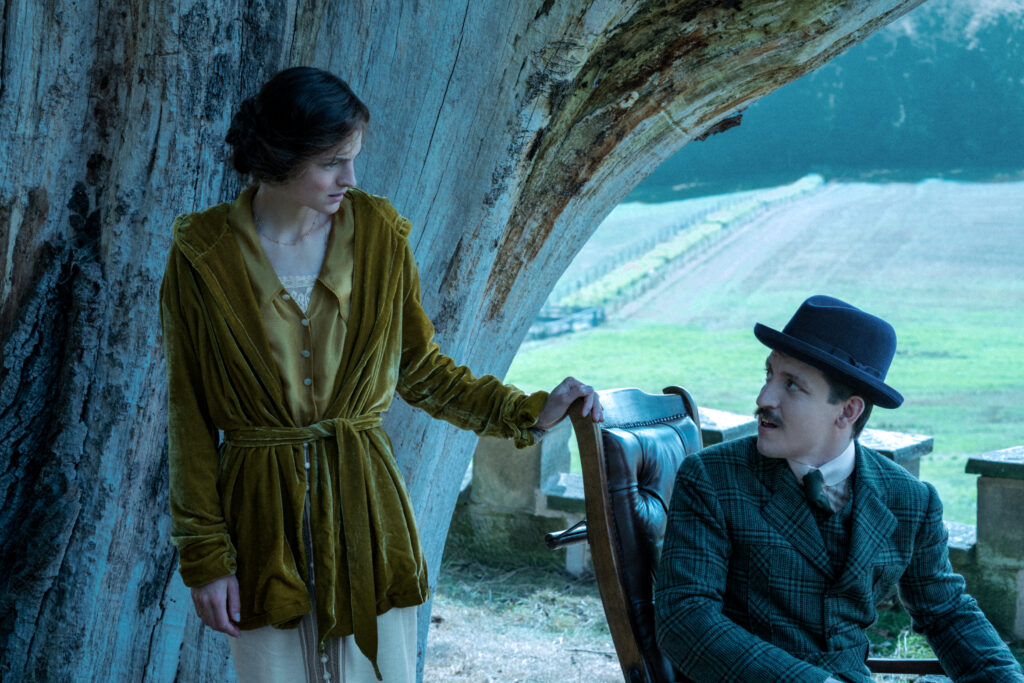November 28, 2022
by Carla Hay

“Lady Chatterley’s Lover” (2022)
Directed by Laure de Clermont-Tonnerre
Culture Representation: Taking place from 1918 to 1919, in the United Kingdom, the dramatic film “Lady Chatterley’s Lover” features an all-white cast of characters representing the working-class, middle-class and wealthy.
Culture Clash: Lady Constance Chatterley’s sex life with her husband comes to an abrupt end after his World War I injuries leave him with paraplegia, and he encourages her to get pregnant by another man because he wants an heir, but the two spouses are not prepared when she unexpectedly falls in love with her secret lover, who is the couple’s gamekeeper employee.
Culture Audience: “Lady Chatterley’s Lover” will appeal mainly to people who are fans of the D.H. Lawrence novel on which the movie is based, as well as people who are interested in erotic love stories that are set in the early 20th century.

Gorgeously filmed and terrifically acted, this version of “Lady Chatterley’s Lover” is the best movie adaptation of the book so far. Emma Corrin and Jack O’Connell give sensuous and romantic performances as the secret lovers who are the story’s main characters. Everything about the movie is authentically detailed to the story’s setting of the United Kingdom in 1918 and 1919, even though the movie’s pace tends to drag in some areas. This movie version of “Lady Chatterley’s Lover” should please fans of D.H. Lawrence’s 1928 novel of the same name (on which this movie is based), as well as viewers who might not have read the book but are interested in early 20th century stories about torrid love affairs and women who unapologetically live their truths. “Lady Chatterley’s Lover” had its world premiere at the 2022 Telluride Film Festival in Colorado and then made the rounds at other film festivals in 2022, including the BFI London Film Festival and AFI Fest in Los Angeles.
Directed by Laure de Clermont-Tonnerre, “Lady Chatterley’s Lover” is the fourth movie adaptation of the D.H. Lawrence book. The first “Lady Chatterley’s Lover” movie is director Just Jaeckin’s 1981 drama, starring Sylvia Kristel as Lady Chatterley and Nicholas Clay as Oliver Mellors, who becomes Lady Chatterley’s lover. Then came director Pascale Ferran’s 2006 French-language film “Lady Chatterley,” starring Marina Hands and Jean-Louis Coullo’ch as the two illicit lovers. There’s also the 2015 BBC TV-movie “Lady Chatterley’s Lover,” directed by Jed Mercurio, and starring Holliday Grainger and Richard Madden as the lady and her lover.
The 2022 movie version of “Lady Chatterley’s Lover” directed by de Clermont-Tonnerre is a cut above the rest, in terms of overall quality on all levels. This movie is also faithful to the plot and tone of the book. As the non-conformist Lady Chatterley, Corrin’s wonderfully expressive performance skillfully conveys the inner turmoil and outer frustrations of an aristocratic wife who is often emotionally stifled in an environment where her husband and society dictate how she must live her life. As the movie’s title character O’Connell is pitch-perfect as the working-class employee who is acutely aware of the social-class minefield he is entering by having an affair with his wealthy employer’s wife.
“Lady Chatterley’s Lover” begins with the 1918 wedding of Constance “Connie” Reid to Clifford Chatterley (played by Matthew Duckett), a wealthy heir to a fortune made from mining. Because Clifford has the title of lord, Connie will have the title of lady when she becomes his wife. The wedding is a happy occasion, because Connie and Clifford seem to genuinely be in love.
But there are some clues about possible trouble in this marriage. On Connie and Clifford’s wedding day, Connie’s older sister Hilda (played by Faye Marsay) has a private conversation with Connie, who had her heart broken by a German ex-boyfriend. It’s implied that Clifford is a rebound relationship for Connie, and they had a whirlwind courtship. This courtship is never seen in the movie.
Hilda tells Connie with concern in her voice, “I don’t want you to get hurt again.” Connie assures Hilda that she made the right decision to choose Clifford as a husband: “He’s kind and thoughtful, and he makes me feel safe.” But is there romantic passion between Connie and Clifford? Connie is about to find out that her marriage to Clifford will come up very short in that area.
At the wedding reception, Clifford’s widower father Sir Geoffrey Chatterley (played by Alistair Findlay) gives a toast to the assembled guests. Observant viewers will notice that behind Geoffrey’s cheerful smile and pleasant mannerisms are a few signs of discontent. One of the signs is when Geoffrey has thanked many of the guests who donated their butter and sugar rations “to help us celebrate.” It’s an indication that although the Chatterley family is wealthy, World I has taken a toll on the family’s finances.
Before making the toast, Geoffrey also makes a snide remark about Connie marrying Clifford (who has no siblings) for the Chatterley family’s sprawling and rural Wragby estate, located in the Midlands of England. Connie laughs off this possible insult and tells Geoffrey and the rest of the crowd that she and Clifford have married for love. Geoffrey’s comment is also an indication that Connie was into a lower-ranking artisocratic family. Connie’s father is Sir Malcolm Reid (played by Anthony Brophy), who approves of the marriage and is briefly shown in the wedding scene. Geoffrey’s toast includes this statement: “To the next heir of Chatterley.”
After the wedding, Connie and Clifford live in London. In their bedroom, she asks him, “Do you want children, Clifford?” He answers, “Yeah, someday. I’m assuming you would.” Connie replies, “I think so, yeah.” The movie doesn’t ever show Connie and Clifford having sex, but it’s implied that they had a healthy sex life before Clifford went off to serve in the military for World War I.
Clifford goes away to war soon after the wedding. “I’ll write to you every day,” he promises Connie at the train station. But when Clifford comes back from the war, after it ends in November 1918, the marriage will be changed considerably. Clifford was wounded in the war and has paralysis from the waist down. He has to use a wheelchair to move around. Clifford’s widower father Geoffrey died during the war, and Clifford has inherited the Ragby estate.
Clifford and Connie both seem to take his paraplegia in stride and agree that he needs to be in a less hectic environment than in a city. They move from London to the Ragby estate, which had largely been unoccupied since the death of Clifford’s father. “I think he died of chagrin,” Clifford says of his father not living long enough to have a grandchild.
At the Ragby estate, Connie and Clifford promptly hire several new employees, now that Clifford and Connie will be living there full-time. One of the people they hire is Oliver Mellors (played by O’Connell), who served as an army lieutenant in the war and has been hired to live and work on the Ragby estate as a gamekeeper. When Connie and Oliver first meet, there’s no attraction between the. It’s strictly an employer/employee relationship.
At first, Clifford seems to be good spirits in adjusting to his post-war physical condition. He’s a writer who decides to expand a short story that he started while attending Cambridge University into a novel. The novel gets published, but Clifford goes into a state of self-criticism and despair after he reads a newspaper article that has a negative review of the book. Connie tries to cheer him up, but this negative review has seemingly damaged Clifford’s self-esteem and confidence as a writer.
Clifford is also feeling insecure because his paraplegia has made him sexually impotent. Connie is as understanding as possible when her attempts to have sex with him end with Clifford stopping and saying, “I can’t.” But this lack of a sex life eventually has serious repercussions on their marriage.
Clifford expects Connie to be his nursemaid because he doesn’t want to pay to hire someone to do this work. (it’s one of many signs that Clifford is a cheapskate.) But the strain of taking care of him has left Connie in poor health. She lost an alarming amount of weight, which has lowered her energy level and immune system.
Hilda comes to visit and is so horrified by Connie’s physical condition, she insists that Clifford hire a nursemaid. Hilda thinks the best choice is a middle-aged widow named Mrs. Bolton (played by Joely Richardson), who was Clifford’s nanny when Clifford was a child. Hilda is strong-willed and very opinionated. Hilda lets it be known that she thinks Clifford could be a more considerate husband to Connie.
With Connie now having more free time without the stress of being Clifford’s nursemaid, her health starts to improve, even if the couple’s sex life hasn’t. But then, Clifford drops a bombshell proposal on Connie: He tells her more than anything, he wants to have an heir (preferably a son), so asks her how she would feel about getting pregnant by another man.
Connie is completely shocked and says she can’t do have sex with another man because she and Clifford are married. However, Clifford cheerfully tells her that he will have her blessing to have an extramarital affair, as long as she’s discreet about it. He also tells Connie that she can choose who her lover will be, but he doesn’t want to know who it is or any other details about the affair. He also compares this arrangement of having sex with a man who’ll impregnate her to “like taking a trip to the dentist.”
At this point in the marriage, Connie just wants to make Clifford happy. And although she’s uncomfortable with this plan, she goes along with it because she also wants to become a parent. Connie takes a mild interest in Oliver, who is a polite and reserved employee who lives in a cottage with his dog Flossie. Connie asks a schoolteacher acquaintance named Mrs. Flint (played by Ella Hunt) what Oliver’s story is.
And that’s how Connie finds out that Oliver is married but separated from his wife Bertha. According to Mrs. Flint, Bertha cheated on Oliver with several men when he was serving in the war. And now, Bertha is living with another man, but she won’t give Oliver a divorce. Connie’s German ex-boyfriend also cheated on her, so she immediately feels empathy for Oliver.
Connie comes up with excuses to visit Oliver or walk near his cottage. The first time she shows up at his place, she’s impressed that he’s reading a James Joyce novel. Over time, Connie discovers that Oliver is a caring and emotionally intelligent person, but he’s very wary about what Connie wants from him and how risky it would be for his employment status if they had an affair.
Of course, it should be no secret to viewers that Connie and Oliver eventually become lovers. When they begin their affair, she doesn’t tell him that Clifford gave her permission to have a lover so that she could get pregnant. She doesn’t tell Oliver because she doesn’t want to hurt his feelings by making him feel like he’s being used like a stud.
However, what Connie thought would be a “no strings attached” sexual relationship turns out to be much more complicated when she and Oliver start to fall in love with each other. Just as Clifford requested, Connie keeps the relationship a secret from him and other people. But the more emotionally distant Clifford gets, the more emotionally intimate Connie and Oliver get with each other.
Clifford seems to care more about writing, listening to the radio, and spending time with Mrs. Bolton (whom he sees as a mother figure/confidante) than he cares about spending time and paying attention to Connie. The movie has more than one scene of Connie being in a room with Clifford, and he acts as if she’s not really there. Feeling neglected and unappreciated just fuels Connie’s passion for Oliver even more because he’s completely present and attentive to her every time that they are together.
When the novel “Lady Chatterley’s Lover” was first published in 1928, it was controversial because its erotic content was considered too risqué, which resulted in the book being banned in some places. The Connie/Oliver sex scenes in 2022’s “Lady Chatterley’s Lover” gradually get more explicit as they fall deeper in love with each other. The lover scenes include occasional full-frontal nudity (male and female), but the nudity and sex scenes are artfully filmed and never look exploitative.
One of the most striking aspects of this version of “Lady Chatterley’s Lover” is Benoît Delhomme’s immersive and beautiful cinematography, whose use of certain palettes (especially blue and green) give the movie a rich vibrancy that is perfectly suited for this type of movie. Also impressive are the production design led by Karen Wakefield and the costume design by Emma Fryer. The attention to detail is impeccable.
All of these technical aspects of the movie just complement how well all of the cast members play their roles. Oliver and Connie might come from different social classes, but they are both an emotionally wounded in their own ways and find unexpected love with each other. The question is how far their loyalty to each other will go.
Connie also begins to understand that the true definition of “class” should not be defined by how much money someone has but what type of character that person has. Clifford is spoiled, self-centered snob who believes that aristocrats should treat non-aristocrats as inferior. Connie feels the exact opposite way and thinks that people should be treated fairly and equally.
It’s later revealed that Clifford exploits his workers by paying them well below a living wage. The movie doesn’t go too much into these worker exploitation issues, although there are indications that Connie becomes more aware as time goes on of the Chatterley family’s role in worker exploitation of the miners in the community. For example, when Connie first meets Mrs. Flint on the street during May Day, Connie is disturbed by the sight of a miner strike/labor protest that briefly becomes volatile. Mrs. Flint tells Connie that these miners have come from out of town, but Connie finds out that the miner’s problems actually hit much closer to home than she originally thought.
One of the main reasons why the “Lady Chatterley’s Lover” novel was so controversial at the time it was published is because it’s about a woman in search of autonomy over her sexuality. The right to control and the freedom to express sexuality have gender double standards that haven’t completely gone away just because there’s been progress made in female empowerment issues since 1928. People can certainly debate the morals of marital infidelity (especially if a spouse gives permission for the other spouse to have sex outside the marriage) and how marital infidelity is presented in this story. However, what this movie demonstrates so well is that the real morality issue in “Lady Chatterley’s Lover” is whether or not Connie can truthfully live according to how she really feels.
Netflix released “Lady Chatterley’s Lover” in select U.S. cinemas on November 23, 2022. The movie will premiere on Netflix on December 2, 2022.


